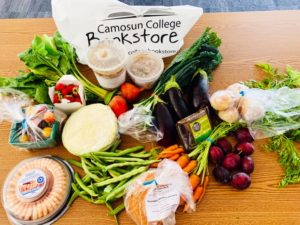As economic issues exacerbated by the pandemic continue, many students are struggling to buy basic necessities. In the first week of March, the Camosun Cares hamper program began its second round of delivering supplies to students. Weekly deliveries will be made for nine weeks; the hampers will include fresh local produce, food prepared by Camosun’s Culinary Arts program, hygiene products, and canned goods.
Camosun International assistant to the director Miki Speirs, who is helping to organize the hampers, says it’s all about helping students, many of whom have lost their part-time jobs or are working on reduced hours.
“I was a student, too,” says Speirs. “I know how hard it is to survive every day.”
The idea behind the program, says Speirs, is to help students who need it so that they can focus on studying.
“I couldn’t have done this on my own. Everybody really came together; all the faculties… [are] delivering using their personal time, using their personal vehicle[s] to deliver hampers to students on their own time. It’s really speaking to the value of Camosun,” she says.

Speirs says that without the help of the Camosun College Student Society (CCSS), the hampers couldn’t be happening. The CCSS donated $10,000 to the program initially, and made an additional donation of $7,000 for this round of hampers.
CCSS external executive Quinn Cunningham says food is quintessential when it comes to learning.
“You can’t be learning on an empty stomach. It’s been shown in studies that it’s not effective,” he says. “That’s why there’s all sorts of programs for primary [and] secondary schools, but in university, it’s also a concern. With the kind of financial insecurity that this pandemic has exacerbated, this sort of programming allows Camosun students to focus on their studies and not have to worry about how they’re getting their next meal.”
The program is run on a first-come-first-serve basis, and Speirs is hoping to raise more money in the future.
“This time, I do see a lot of demand—160 applicants in the first week—so I do believe the demand could be a little bit more as the pandemic might progress… Or it might calm down a little, but I do believe the demand is going to go up,” she says.
If the demand is there along with the funds, Speirs says she is hoping to extend the program to be longer than nine weeks.
“I’m constantly asking community members for donations,” she says, adding that there are no restrictions on who can donate. “[I’ve been] asking [the] public to spare $45 for a hamper. Donations keep coming.”
Speirs says that she has noticed this time around they are getting more donations from community partners.
“So most of the year, we didn’t actually have to purchase the goods anymore,” she says. “It was all donated.”
Speirs says there are good quality products—local produce and Fatso peanut butter, for example—in the hampers.
“It’s exciting to see how many communities just really reached out to us,” she says. “It’s all about helping students.”
